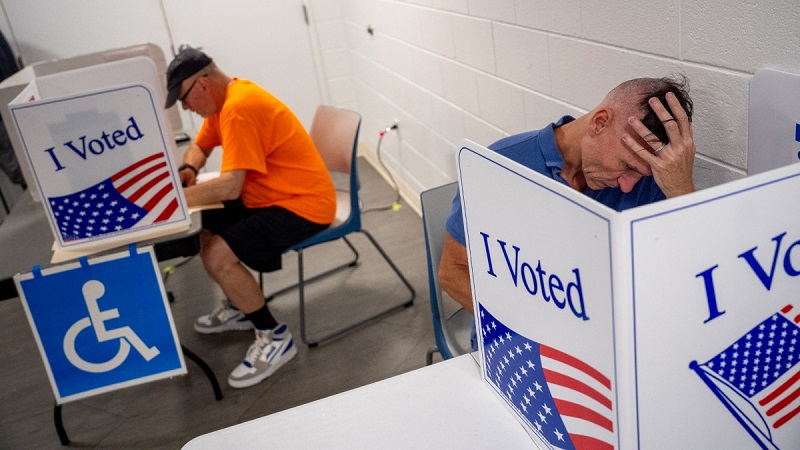
Below we reproduce a fragment of the report made in 2020 for the Claves Internacionales program a Katerina Oziashvilipolitical scientist and professor at Sarah Lawrence University in New York, Carmine Maffeasociologist and editor of Left Voice, site of the International Network La Izquierda Diario in New York.
One of the pillars of the democratic system is the right to vote, which supposedly makes men and women equal before the law. How does the US Constitution enshrine that right?
Katerina Oziashvili: It’s funny because when I teach about American politics, one of the first questions I ask my students is: The American Constitution is considered the most democratic constitution in the world by Americans, so what does it say about the right to vote? and my students say “I guess we have the right to vote” and of course the answer is that it doesn’t say anything about the right to vote, it doesn’t give people the right to vote. People often say that the 15th amendment gave the black community the right to vote. It’s not correct. It just says that you can’t discriminate based on race, which is a very important distinction. African Americans have been systematically disenfranchised throughout American history after the passage of the 15th amendment. The poll tax, for example, was implemented after the passage of the 15th amendment. The poll tax basically said that You have to pay an amount to be able to vote, which excluded all the poor, including African Americans, of course. Registration laws [de votantes]you can see how they were created specifically in the late 19th century and early 20th century with the growth of cities, because the only thing the elites feared was the proletariat. They did not include in those laws the rural areas where electoral fraud was actually occurring.
Poll tax, registration laws. How did formulas for disenfranchisement evolve in the United States?
Carmin Maffea: Blacks could not vote during slavery, but even after the abolition of slavery, due to the need to maintain this series of deprivation of rights, the so-called “Jim Crow laws” were introduced that contributed to the suppression of the vote with issues such as evidence literacy programs that were explicitly developed to ensure that newly freed blacks could not contribute to the electoral process. After the “Voting Rights Act” of 1965 was passed due to the development and radicalization of the Civil Rights movement, the State was forced by the movement of the working class and blacks in the streets, the State was forced to repeal Jim Crow laws, however adapted, had to adapt to this new practice of subordination and voter suppression.
The right to vote is not enshrined in the US Constitution, and there is also what is commonly called “voter suppression.” What’s that?
Carmin Maffea: It is the practice of systematically preventing people from contributing to the electoral process through voting. This happens in a large number of ways, there are different ways in which this is done. First and foremost is the Electoral College, I think it is the most explicit example. The reason this is inherently undemocratic, the reason we say there is “voter suppression” is that, let’s say 25% of people in a state voted for another candidate, they voted for another party, it doesn’t matter, whichever one Win takes all the delegates. If the majority of that state votes for a candidate, that’s it. And those others who voted for another candidate or whatever like… it’s a shame. There are many others, for example the closure of voting centers in low-income, predominantly black and Latino neighborhoods. It happened in Georgia, where people were forced to wait up to 10 hours to vote. And there is another problem that arises from this, on election day people do not have the day off, the elections are on a Tuesday. People are forced to choose between going to work or going to vote and if you think about it deeply, that affects lower income workers who are predominantly black and Latino the most because they can’t afford to take the day off of work and They can’t afford to wait 10 hours in line. Although the United States has about 5% of the world’s population, it has about 25% of the world’s prison population, and that prison population is highly racialized, it is disproportionately black and Latino, and you cannot vote while you are serving your sentence, and if you have a felony, which is when you spend up to a year in prison, if you have that on your record in many states you are not allowed to vote at all.
Voting is not mandatory and to do so, a registration process is necessary. People with criminal records are prohibited from participating in the election, which falls mainly on Afro-descendants and Latinos due to the racism of the police and judicial system. Millions of undocumented immigrants are also left out. In the supposed “country of freedom” direct voting does not work. Citizens vote electors, who then in another instance, an Electoral College of 538 members, will choose the future president. The number of electors that each state has is not proportional to its number of inhabitants and in most states the party that has the most votes, even 1 more, takes all the electors, which eliminates the representation of minorities. The election is won by whoever reaches 270 electoral votes, half plus one. This means that not necessarily the candidate who receives the greatest number of popular votes will be the winner, but rather the one who obtains the greatest number of voters in the College. This is how in 2016 Donald Trump was able to assume the presidency having lost the popular election by 3 million votes.
Why can it happen that someone wins the popular vote and yet loses the presidency?
Katerina Oziashvili: The best, most common example is comparing California with Wyoming. California is the most populous state, Wyoming is the smallest state in the country. California has 55 electors and Wyoming has 3, the number of electors per state is calculated based on the number of members of the House of Representatives that each state has, which is proportional to the population, plus 2 senators per state. Since the Senate is not proportional to population, each state, no matter how small or large, has 2 senators. It is a clear violation of political equality which means that a person has the right to one vote. California has 55 electors and Wyoming has 3 electors. California has 18 times the voting power of Wyoming, but has 57 times the population of Wyoming, meaning Wyoming has much more power in electing the president than California. And this is very important because it privileges the less diverse small rural states at the expense of the more diverse large urban states, once again effectively disenfranchising the proletariat and the black community of the vote. So if the majority of the people, 51% of the people in California vote for, say, a Democratic candidate, that person will get the 55 electors and the other 49% who voted against that candidate get nothing.
You can read all the articles about the elections in the United States here
Below you can see the complete interviews and the Claves Internacionales 2020 program.
Source: www.laizquierdadiario.com

